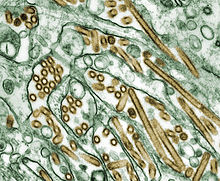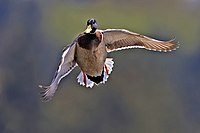H5N1 hits Britain
Saturday, February 3, 2007
H5N1, the deadly strain of bird flu that has already claimed many lives in Asia, was confirmed this morning as the strain that killed 2,600 turkeys on a farm in Suffolk.

The Department of Environment, Food and Rural Affairs (DEFRA), conducted further tests to determine the strain after it was found that most of the turkeys on a Bernard Matthews farm showed signs of illness and tested positive for avian flu in preliminary tests.
As a further precaution, 159,000 turkeys from the same farm will be culled.
The European Council issued a directive stating that a protection zone (a zone where all birds are to be kept indoors and biologically tested for the flu) should be set up on a 3 km radius from the infected farm. They also ordered a 10 km radius "surveillance" zone whereby the sale of birds at markets is banned, water used by domestic and wild birds is to be kept separate, pedestrian movement is limited, an increased awareness of the symptoms of affected birds and birds are not to be transported unless being transported to slaughter.
Officials are confident that the outbreak has been contained but ask people to be vigilant.
Help lines
editSuffolk County Council also set up a helpline for people with queries or if they find birds showing signs of malaise: 08456 032 814.
Defra has also made general advice on avian-flu available on its helpline: Defra Helpline - 08459 33 55 77
Related news
edit- "Bird Flu confirmed in 1000 UK turkeys" — Wikinews, February 3, 2007
Sources
edit- "1,000 turkeys killed by bird flu" — BBC News, February 3, 2007
- "Tests show bird flu is H5N1" — BBC News, February 3, 2007
- "H5N1 avian influenza confirmed in poultry" — Defra, February 3, 2007
- "Avian influenza test result on poultry" — Defra, February 2, 2007
